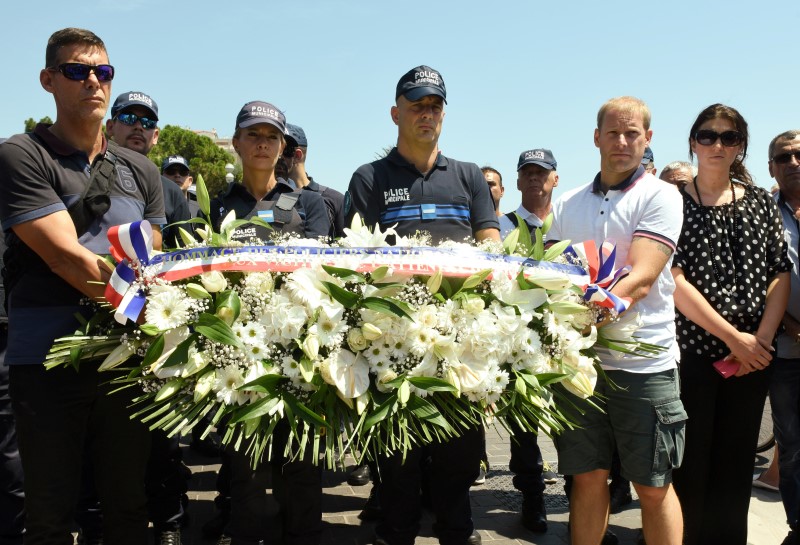By Sophie Louet and Richard Lough
PARIS (Reuters) - France's government closed ranks around Interior Minister Bernard Cazeneuve on Monday and accused conservative opponents of fanning allegations that his office sought to alter a report into policing on the night of the deadly Nice attack.
Prime Minister Manuel Valls said he had full confidence in Cazeneuve, who on Sunday dismissed an assertion by the head of Nice's video surveillance that ministry staff pressured her to indicate the presence of national police force officers at certain sites where the attack unfurled.
In a television interview, the usually unflappable Cazeneuve hit out at right-wing politicians from Nice, led by the regional president Christian Estrosi, who he accused of almost daily lies and political broadsides in the wake of the Nice massacre.
"This has to stop, there can be no room for doubt in the fight against terrorism," Valls said. "I don't have any doubts about Bernard Cazeneuve."
President Francois Hollande, who has publicly backed Cazeneuve, said there was "no place for controversy or confrontation" and that investigators would establish the truth.
Valls' Socialist government is under fire for not doing enough to prevent a 31-year-old Tunisian ploughing his rented truck through a crowd of revellers on a Nice beachfront boulevard, killing 84 people. The Islamic State militant group claimed responsibility for the attack.
The ease with which Mohamed Lahouaiej Bouhlel reached the pedestrianised Promenade des Anglais in the 19-tonne truck, using an apparently unblocked route, has become a focus for criticism of security arrangements.
Ten months ahead of general elections, Estrosi and other local conservatives have aggressively criticised the strength of the national police force presence on the night of July 14.
Valls accused them of copying the tone of U.S. Republican presidential nominee Donald Trump, whose campaign has been marked by insults and inflammatory rhetoric, and seeking to destabilise the government.
Responding to Cazeneuve's Sunday night comments, Estrosi told Europe 1: "To insult elected officials is in a way to insult the memory of the victims. We are not instrumentalising anyone, we are only demanding answers.
"The state has to stop obstructing the truth."
Nice, a French Riviera city of nearly 350,000 people and a stronghold of the hard right, is France's most heavily policed urban area and has an extensive network of surveillance cameras.
Sandra Bertin, head of the city's CCTV camera network, told the Journal Du Dimanche that she had been harassed by an interior ministry official who wanted a report that confirmed national police could be seen at two particular sites - a fact she said could not be confirmed by CCTV footage.
Bertin's lawyer said on Monday she had passed details of the events to the prosecutor's office and added that his client had not been used politically. Earlier, Justice Minister Jean-Jacques Urvoas criticised Bertin for taking her complaint to a newspaper and not the prosecutor.
